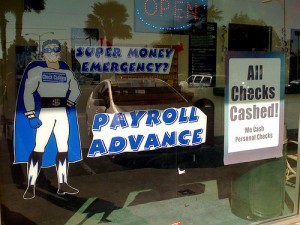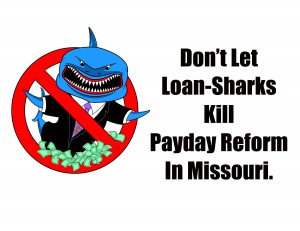On Tuesday of this past week (July 31, 2012), the Missouri Supreme Court ruled that a ballot initiative capping the interest rate of small loans at 36% (including payday loans) will appear on the Missouri general ballot this coming November. This court decision is terrific news for the many poor, working-poor and struggling middle class people who have been victimized by predatory lenders throughout Missouri.
I have previously discussed this hotly contested payday loan court case here. The payday loan industry had attacked this ballot initiative on numerous technical grounds, including constitutional issues, but in its July 31, 2012 decision, the Missouri Supreme Court shot down all of the arguments of the industry, holding that the payday initiative will go on the Missouri ballot in November. Here’s the entire opinion of the Court. Thanks to the Missouri Supreme Court, Missouri citizens will now have the opportunity to decide whether to cap Missouri payday loans (and other small loans, such as “title loans”) at 36%. Now you might think that 36% sounds like a high rate of interest, but read on (after reviewing these basic facts about payday loans from the Center for Responsible Lending).

This decision of the Missouri Supreme Court is good news for the almost 185,000 Missouri citizens who signed the ballot initiative and for the millions of citizens who will now get to step up to a ballot and express what they think of loans of 300%, 400%, or 500% interest, or more. These numbers are not misprints. Many people I speak with tell me that they are aware that payday loans are “high interest,” but then they then incorrectly guess that payday lenders charge an interest rate of “about 25 or 30%.” Nope. Not even close. Payday lenders typically charge interest rates of more than ten times that amount. And yes, these are the types of interest rates that were illegal when they were charged by loan sharks back in the 1930’s. How can these modern day predatory lenders get away with charging this much? Missourians have their legislators to thank, along with our despicably corrupt system of campaign financing.
This insane rate of “running the juice” on loans too often drives borrowers over the edge into inescapable debt, foreclosure and bankruptcy. What seemed like a good idea to a person struggling to get through a minor crisis for the next day or commonly two turns into unrelenting and suffocating debt. One of my clients (I am a consumer attorney) took out a payday loan of $500 to get her through a crisis after getting ripped off by a mortgage lender. One year later, she had paid almost $2,000 in interest and she still owed the $500 principal. She was a customer of “Quik Cash,” one of the two biggest payday lenders in Missouri (the other is Advance America).
These payday loan interest rates are so insanely high that back in 2007 Republicans led the charge to impose a 36% cap on the annual interest rate for payday loans made to military service members and their spouses. This move by Congress inexorably leads to a compelling follow-up question, of course: If payday loans are so bad for soldiers, why shouldn’t they be capped for the rest of us too? The clear answer is that they should be capped everywhere. And this is the same reason for the existence of usury laws in most states, usury laws that have existed ever since the founding of the United States.
Over the years, I have not been subtle regarding what I think about the pain and financial destruction caused by payday loans. Last year, I even wrote a song aimed at payday lenders. These are dangerous financial products for their users, many of whom get caught up in endless high interest debt. These loans are highly likely to cause financial damage and they also cause immense non-financial strain and conflict within families. Piling a payday loan onto an already stressful financial situation can be devastating. I have met and represented many families who have been unable to extract themselves from payday loans. How do they qualify for such loans? Easy – the payday lenders have no meaningful underwriting process. If you are a warm body with some sort of an income, payday lenders are happy to get you hooked on their financial version of crack cocaine. Once you are hooked, they threaten you in a variety of ways, including a flurry of calls to your friends and family in efforts to collect the debt, the threat of a damaged credit rating and the threat of repeatedly submitting your post-dated check to your bank, which can ruin a person on the financial edge, causing them to enter the surreal world of the unbanked.
You would be surprised at many of the arguments payday industry make as to why we “need” payday loans. At the trial of the case decided by the Missouri Supreme Court on Tuesday, the payday industry’s expert claimed that the health of the Missouri economy depends on the availability of payday loans. This is outlandish, given that payday loans suck money out of the state and local economies, keeping people from paying their bills to legitimate merchants, and further given that these predatory loans had been outlawed from coast to coast until the 1990s. How was it that the economy often boomed in the absence of payday loans? The industry does not have an honest answer. I have heard many in the payday loan industry, as well as a prominent Missouri Republican politician, claim that payday loans should be freely available because we need to allow “freedom of choice.” I disagree for the reasons stated by Elizabeth Warren (who was referring to dangerous mortgages):
“It is impossible to buy a toaster that has a one-in-five chance of bursting into flames and burning down your house,” she wrote. “But it is possible to refinance an existing home with a mortgage that has the same one-in-five chance of putting the family out on the street.”
Yes, even if one out of 10 families gets trapped in payday loans, they should be capped. There are safe alternatives to payday loans (such as the “payday alternative” loans offered by credit unions), but the industry doesn’t want you to hear about these. Instead, they jam rooms full of their own employees so that concerned citizens cannot get a seat when payday loans are discussed with politicians. The payday lenders would love to stifle the conversation about whether we should cap payday loans. Thanks to the recent decision by the Missouri Supreme Court, the citizens of Missouri will now have that conversation in public. 
Since I originally published this piece, two friends commented that 36% is still awful. I admit that the new rate is not a bargain rate; it’s not a rate at which I would like to borrow money. On the other hand, there was a REASON that the lenders hated the 36% cap and thus fought so hard against it. 36% is a natural place to set the rate given the federal statute that caps payday lenders near military bases at 36%. This is way less than 400%, which is typical for Missouri payday loans. And consider this example: $500 borrowed for a year (lenders often illegally stretch these loans out for many months by offering a string of “new loans”) at 400% is $2,000 of interest, which is crushing. $500 borrowed at 36% is $180. No, it’s not perfect, but it will no longer be crushing for consumers. The new rate will give them a fighting chance. It will save a lot of people a lot of heartache.
I was honored to be one of several attorneys who worked on the appellate briefs in the case decided by the Missouri Supreme Court. It was a team effort by the attorneys defending the ballot initiative, and several of us worked on this case pro bono; that’s how important this issue is for us. We were thus delighted to see that the Missouri Supreme Court decisively recognize the critical importance of the ballot initiative process, an exercise of direct democracy.
 This decision is not yet a victory. For that, we need to turn out millions of voters in November. We need to explain the importance of this issue to each other so that our fellow citizens don’t get confused by the barrage of TV and radio lies they are about to hear from the payday industry prior to the November vote. In an attempt to address some of those expected lies, I am including (below) a ten-minute video of a 2010 presentation given by my colleague, John Campbell (John and I have worked together to sue payday lenders, as well as working together on the recently-decided case). John’s presentation occurred at a public hearing in South St. Louis regarding proposed legislation that would cap loans at 36%. This 2010 legislation didn’t have a chance in the Missouri Legislature, however (that is the reason for the current ballot initiative, which takes the issue straight to the people). Mr. Campbell made this presentation to a large room that had been filled almost entirely by payday loan employees at the behest of their employers.
This decision is not yet a victory. For that, we need to turn out millions of voters in November. We need to explain the importance of this issue to each other so that our fellow citizens don’t get confused by the barrage of TV and radio lies they are about to hear from the payday industry prior to the November vote. In an attempt to address some of those expected lies, I am including (below) a ten-minute video of a 2010 presentation given by my colleague, John Campbell (John and I have worked together to sue payday lenders, as well as working together on the recently-decided case). John’s presentation occurred at a public hearing in South St. Louis regarding proposed legislation that would cap loans at 36%. This 2010 legislation didn’t have a chance in the Missouri Legislature, however (that is the reason for the current ballot initiative, which takes the issue straight to the people). Mr. Campbell made this presentation to a large room that had been filled almost entirely by payday loan employees at the behest of their employers.
It should be noted that the ballot initiative is not a perfect solution. The Missouri legislature has disrespected the will of the people:
Missouri is one of only ten states that allow the state legislature to amend or repeal an initiative statute at any time after its adoption by a simple majority of both houses. A number of other states—including Alaska, Arizona, Arkansas, California, Michigan, Nebraska, Nevada, North Dakota, Utah, Washington and Wyoming—provide greater protections to voter-approved initiatives, such as requiring either a time period to elapse or a supermajority vote in order for the legislature to amend the measure.
Nonetheless, Missouri citizens will now have the opportunity to weigh in on this topic in a public way, and if the initiative passes overwhelmingly, which I believe it will, it should give the legislators substantial cover to tamp down the payday lenders, who have flourished like a virus across the United States. In fact, there are more payday lenders than McDonalds and Starbucks combined (see this stunning infographic). The Missouri legislature has made Missouri one of the most legally hospitable states for payday lenders. It’s now time to clamp down on the loan sharks by putting away Missouri’s big payday lender welcome mat.
[Note: The payday loan shark image was created by cartoonist Ray Gregory, a friend of mine, who has made this image available for use by anyone who wishes to advocate for limiting or eliminating payday loans anywhere, including Missouri].


Great post! Thanks for sharing the information. Indeed, proposing to place a reasonable cap on the annual interest rates charged by payday and title loan companies is a good idea. I’m afraid to say, some of pay day loan providers are taking advantage. Overall, Payday loan initiatives taken off ballot.
Great post! Thanks for sharing the information. Indeed, proposing to place a reasonable cap on the annual interest rates charged by payday and title loan companies is a good idea. I have heard that there are a ton of different laws that could possibly be put on the voter’s ballot in the fall to restrict or limit payday cash advances. The only issue is that people have finally realized payday cash advances are essential and really not that bad of a product. The industry is one of the most regulated right now anyway. Overall, I have heard that there are a ton of different laws that could possibly be put on the voter’s ballot in the fall to restrict or limit payday cash advances. The only issue is that people have finally realized payday cash advances are essential and really not that bad of a product. The industry is one of the most regulated right now anyway.
Sorry, Erich but, the ballot measure did not get enough signatures to go on the November 2012 ballot in Missouri and the supporters have given up (for now). You may call the Missouri Secretary of State as I did to confirm the facts: 573-751-2301.
The case referenced only said the ballot language and issue were OK to be put on the ballot but, they still needed the required number of signatures to be placed upon the November ballot and didn’t make it.
It would be accurate to say the industry used up what few resources supporters had to spend to gather signatures on a frivolous challenge but no one filed any motion in that regard (Section 514.205.1 RSMo).